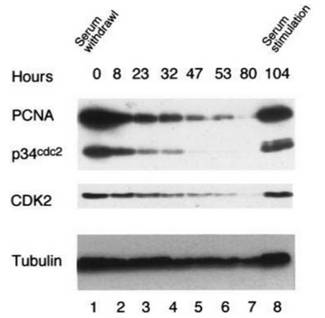Ximbio's monoclonal antibody Anti-Cdk1 clone 17 (A17) was cited in a recent Platelets paper authored by a group from Zhejiang University. This paper investigated the effects of platelets on chrondrocytes; in a rodent osteoarthritis model it was shown that platelets promoted chrondrocyte proliferation.
Cyclin dependent kinase 1 (cdk1) is a serine/threonine kinase which forms a complex with cyclins A or B. This complex can then go on to phosphorylate a variety of target substrates to enable cell cycle progression. Due to this Cdk1 is a proliferation marker and high activity levels can be observed in neoplastic cells.

Half life of p34cdc2 (Cdk1), PCNA and CDK2 in 3T3 cells after serum withdrawal. Clone 17 (A17) was used to detect Cdk1. (Gannon et al. 1998. Genes Cells. 3(1):17-27. PMID: 9581979.)
Clone 17 (A17) was raised against a carboxy-terminal fragment of Xenopus laevis cdk1. As cdk1 is conserved throughout multiple species this antibody has reactivity in human, mouse, rat, amphibian and chicken samples.
Anti-Cdk1 was developed by Dr Julian Gannon at the Cancer Research UK: London Research Institute. Dr Gannon spent his career investigating the regulation of the cell cycle, predominantly around the activation of the anaphase-promoting complex/cyclosome and Cdc20.
HAVE YOU REGISTERED?
Join the ever-growing global Ximbio community. Register and receive updates about new reagents, institutes and new features being added to the website.
